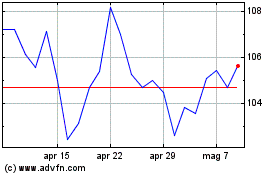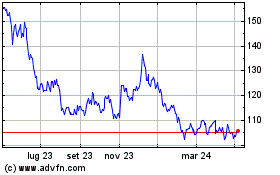Opposition would take over digital network, offer free broadband
if it wins December vote
By Max Colchester
This article is being republished as part of our daily
reproduction of WSJ.com articles that also appeared in the U.S.
print edition of The Wall Street Journal (November 16, 2019).
LONDON -- The U.K.'s main opposition Labour Party, maneuvering
for advantage in national elections next month, is planning to run
on its most leftwing platform in decades. Its latest plan:
nationalize part of the country's telecoms network and give
citizens free broadband.
The proposal to take over the digital network now owned by one
of the country's largest telecoms companies comes on top of its
plans to nationalize water companies, the postal service and rail
operations.
The telecoms pledge, announced Friday by Labour leader Jeremy
Corbyn, is part of a vision to remake the British economy and
appeal to traditional Labour voters who may be tempted by Boris
Johnson's plan to pull the U.K. out of the European Union by Jan.
31.
"What was once a luxury is now an essential utility," Mr. Corbyn
said. "That's why full-fiber broadband must be a public
service."
Mr. Johnson's Conservative Party condemned the plan as a
"fantasy" that would cost "tens of billions" of pounds.
The market reaction to Mr. Corbyn's announcement was muted as it
looks unlikely that the Labour Party will win an outright majority
in the Dec. 12 election. The party is currently trailing the
Conservatives by around 10 percentage points in opinion polls.
If Mr. Johnson fails to gain a majority, Labour could come into
power with the support of smaller parties. However, under those
circumstances, Labour would likely be forced to ditch some of its
campaign pledges.
Labour's full election manifesto is due to be finalized this
weekend, but elements of it already outlined -- including a
four-day working week to be introduced over 10 years and extra
government spending running into hundreds of billions of pounds --
suggest a further leftward shift beyond the pledges it made for the
2017 election campaign. In 2017, the party gained 30 seats with a
40% share of the popular vote, its highest since 2001.
Labour's shift has echoes on the other side of the Atlantic.
Prominent U.S. Democratic Party presidential contenders like
Elizabeth Warren and Bernie Sanders are laying out agendas that
call for a significant redistribution of economic resources from
the highest earners and break up big tech companies.
Labour's moves reflect the ascendancy of the party's left wing
in the past decade, including the rise of self-avowed socialists
such as Mr. Corbyn and John McDonnell, his Treasury spokesman.
Pushing this agenda has been Momentum, a group of mainly young
Labour activists whose 40,000 members have pushed Europe's largest
socialist party to re-invent itself as a hard left-wing movement,
in the past four years.
The party is now seeking to bury the legacy of two former
British prime ministers detested by the British left: Margaret
Thatcher and Tony Blair.
Mrs. Thatcher's Conservative government privatized large swaths
of the British economy in the 1980s and subdued the trade union
movement. Mr. Blair is one of Labour's own. He was prime minister
for a decade from 1997 and won three general elections, but earned
many Labour activists' scorn by moving the party to the center and
supporting the U.S.-led war in Iraq.
The promise of free broadband is a pitch to traditional Labour
supporters. Once the state-owned telecoms monopoly, the then
British Telecom, was privatized in 1984 by Mrs. Thatcher. The
remaining government stakes in the company were sold in the
early-1990s.
The Labour moves open up a clear division with the Conservatives
even though both parties promise big increases in public
spending.
Mr. Johnson's pledges to boost spending on policing, health and
education are less ambitious than Labour's spending plans, but
represent a significant relaxation from the tight fiscal stance
advocated by his Conservative predecessors.
But Mr. Corbyn's vision of the state taking back control of
several industries contrasts with Mr. Johnson's emphasis on a more
market-oriented economy opening up to trade with economies like the
U.S.
Mr. Corbyn's plan entails nationalizing the digital network and
related businesses owned by BT PLC, which it says would cost
GBP15.3 billion ($19.7 billion). BT's shares fell 3.7% on the news
before recovering to be less than 1% lower in an overall market
that edged up. The company's market capitalization is about GBP19
billion.
BT's OpenReach is a national network used by a number of
competing telecoms operators in the U.K. including Vodafone PLC.
The main competitor to BT OpenReach is Virgin Media, owned by
Liberty Global plc. Mr. McDonnell, the finance spokesman, said
Virgin could be nationalized as well.
Labour said the nationalized entity would be called "British
Broadband" and that BT shareholders would receive compensation in
the form of government bonds.
The project would be funded in part with a tax on online giants,
including Amazon.com Inc., Facebook Inc. and Google. The
nationalization is part of a Labour plan to roll fiber broadband
out across the country by 2030.
Neil McRae, BT's chief network architect, tweeted "Labour plans
broadband communism."
BT said in a statement that "whatever the result of the
election" it would encourage the next government to work with all
parts of the industry to accelerate the roll-out of full-fiber
broadband and 5G across the U.K.
Write to Max Colchester at max.colchester@wsj.com
(END) Dow Jones Newswires
November 16, 2019 02:47 ET (07:47 GMT)
Copyright (c) 2019 Dow Jones & Company, Inc.
Grafico Azioni Bt (LSE:BT.A)
Storico
Da Mar 2024 a Apr 2024

Grafico Azioni Bt (LSE:BT.A)
Storico
Da Apr 2023 a Apr 2024
